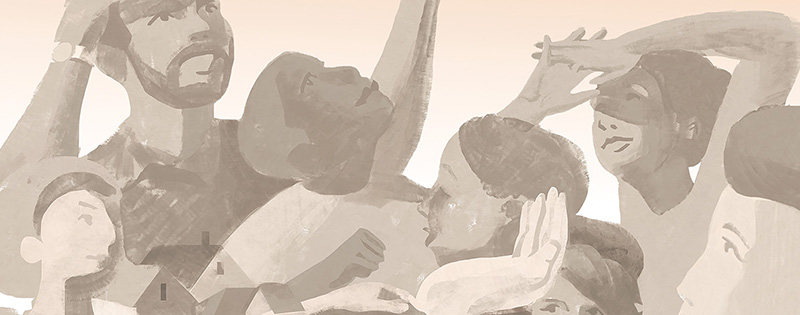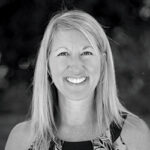
The idiom “blood is thicker than water” has always felt constricting. When I was young, my parents often used the phrase when they thought I had given too much energy and time to my relationships with my friends. While the phrase has multiple interpretations and possible origins—from a 12th-century German fable to a 3,000-year-old Middle Eastern saying—it is now commonly understood to mean that family bonds and loyalties are more substantial than other relationships outside of the familial structure. But my experience has led me to know that friendships are equally important to my biological family relationships.
I met Brad at a small Bible school in Alberta, Canada, through a mutual love for music, humor, and throwing theme parties. Little did I know, at the time, how much beauty, tears, and fun would stem from our friendship over the next 33 years. Later, when we both found ourselves in South Dakota several years after we started college, we established deep and lasting roots with Bill, Joy, and Ann, forming what became our “chosen family.” But as 18-year-olds and first-year college students, we couldn’t have expected where our friendship would lead us.
The chosen family Brad and I are a part of now consists of six adults, three young adults, and several “first cousins” (other friends who are connected to the entire family). Geography had much to do with the growth and development of our family. Most of us were in Sioux Falls, South Dakota, at the same time for school. Then, one by one, after graduate school, we migrated west to work at a private Christian college in Washington state. Now, we live across the United States and get to be together once or twice a year. Our bond is strong, and we are committed to one another through sickness and health. We have been together through miscarriages, births, job losses, parents’ deaths, weddings, and 24 Thanksgiving meals.
Like a birth family, we have rituals and traditions that are a part of our family norms. For example, we have a Thanksgiving tablecloth where we write, with a permanent marker, what we are thankful for each year. Then, when the tablecloth gets washed, we have a family book where we transcribe what we’ve written that year. The book includes favorite ridiculous quotes that each of us has said over the years and summaries of the activities and memories we have made. In the past, we sent out a family photo Christmas card that we gave to our birth families and people who know us all. The customs we have constructed add to the richness of who we are as a chosen family.
If it were not for this group of nine people, I would be a different human. They have shaped and stretched me in ways only trusted friends or family could. I am eternally grateful for my chosen family and the joy and light they bring to my life.
Do you desire to expand the idea of what family can look like for you? Who are the friends that feel like family? I encourage you to commit to these people in a new way. Commitment looks different to each of us, so find what that means to you and your friends: show up, celebrate, mourn the losses, and create rituals and traditions together. Life can be so difficult and so filled with joy, and through it all, we need one another.

Nicole Boymook is executive director of student concerns and works with students, staff, and faculty to aid in fostering an equitable community. She holds a Master of Arts in Marriage and Family Therapy and a Doctorate in Higher Education Leadership. Dr. Boymook has worked in higher education for over 20 years and is a dedicated educator, mentor, and administrator for bettering the student experience.
The idiom “blood is thicker than water” has always felt constricting. When I was young, my parents often used the phrase when they thought I had given too much energy and time to my relationships with my friends. While the phrase has multiple interpretations and possible origins—from a 12th-century German fable to a 3,000-year-old Middle Eastern saying—it is now commonly understood to mean that family bonds and loyalties are more substantial than other relationships outside of the familial structure. But my experience has led me to know that friendships are equally important to my biological family relationships.
I met Brad at a small Bible school in Alberta, Canada, through a mutual love for music, humor, and throwing theme parties. Little did I know, at the time, how much beauty, tears, and fun would stem from our friendship over the next 33 years. Later, when we both found ourselves in South Dakota several years after we started college, we established deep and lasting roots with Bill, Joy, and Ann, forming what became our “chosen family.” But as 18-year-olds and first-year college students, we couldn’t have expected where our friendship would lead us.
The chosen family Brad and I are a part of now consists of six adults, three young adults, and several “first cousins” (other friends who are connected to the entire family). Geography had much to do with the growth and development of our family. Most of us were in Sioux Falls, South Dakota, at the same time for school. Then, one by one, after graduate school, we migrated west to work at a private Christian college in Washington state. Now, we live across the United States and get to be together once or twice a year. Our bond is strong, and we are committed to one another through sickness and health. We have been together through miscarriages, births, job losses, parents’ deaths, weddings, and 24 Thanksgiving meals.
Like a birth family, we have rituals and traditions that are a part of our family norms. For example, we have a Thanksgiving tablecloth where we write, with a permanent marker, what we are thankful for each year. Then, when the tablecloth gets washed, we have a family book where we transcribe what we’ve written that year. The book includes favorite ridiculous quotes that each of us has said over the years and summaries of the activities and memories we have made. In the past, we sent out a family photo Christmas card that we gave to our birth families and people who know us all. The customs we have constructed add to the richness of who we are as a chosen family.
If it were not for this group of nine people, I would be a different human. They have shaped and stretched me in ways only trusted friends or family could. I am eternally grateful for my chosen family and the joy and light they bring to my life.
Do you desire to expand the idea of what family can look like for you? Who are the friends that feel like family? I encourage you to commit to these people in a new way. Commitment looks different to each of us, so find what that means to you and your friends: show up, celebrate, mourn the losses, and create rituals and traditions together. Life can be so difficult and so filled with joy, and through it all, we need one another.
Nicole Boymook is executive director of student concerns and works with students, staff, and faculty to aid in fostering an equitable community. She holds a Master of Arts in Marriage and Family Therapy and a Doctorate in Higher Education Leadership. Dr. Boymook has worked in higher education for over 20 years and is a dedicated educator, mentor, and administrator for bettering the student experience.
Michael Hardin, professor of marriage and family therapy, describes how families and communities might walk alongside their loved ones who leave the Christian faith.